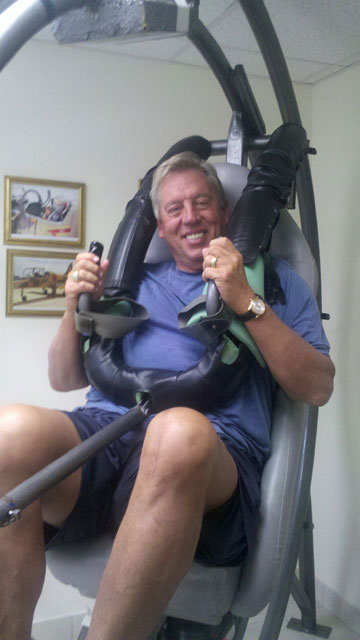


JOHN LI, M.D.
OTOLOGY NEUROTOLOGY RESOURCES
210 Jupiter Lakes Blvd #5105
Jupiter, FL 33458
Phone: (561)-748-4445
Fax: (561)-748-4449
Email: Dr-Li@Dr-Li.net
Vertigo

“Doc, I’m dizzy and imbalanced.” These are probably some of the most common words uttered in medical practice. Millions of Americans go to their physicians with this complaint. Unfortunately, from the physician’s standpoint, this complaint opens an enormous “can of worms”. Dizziness can be caused by a variety of disorders ranging from something as simple as dehydration to something as serious as a brain tumor. To add to this confusion, dizziness may involve many specialists. If the problem is related to heart disease a cardiologist may need to be involved. If the dizziness is from inner ear problems, an ENT (ear, nose and throat) specialist might be consulted. Neurologists, neurosurgeons and psychiatrists may also be needed as well.
Dizziness is not only difficult to diagnose, it can be very difficult to treat. Certain types of vertigo can be managed with diet or medications. Some may require surgery, others may require the Canalith Repositioning procedure (a nonsurgical cure for benign positional vertigo). There are some forms of dizziness that neither surgery nor medications can help. This may include people who have suffered head injury, spinal cord injury, stroke, diabetes and other peripheral neuropathy patients, blindness and poor vision and inner ear disorders such as labyrinthitis, Meniere’s disease, and postoperative brain tumor patients.
The diagnosis of Vertigo and Imbalance require a methodical approach and being sensitive to clues and patterns noted from physical exam and history. The process of diagnosis begins with taking a thorough history, followed by a Neurotological exam. Some diagnoses can be made just based upon that alone. Others need further testing to elucidate. Here is a list of Differential Diagnoses for Vertigo (Round up the Usual Suspects).

Peripheral vestibular system (Inner ear problems)
Benign positional vertigo
Meniere's, endolymphatic hydrops
Labyrinthitis Viral or Traumatic
Vestibular neuronitis / neuritis
Superior semicircular canal dehiscence
Benign Intracranial Hypertension / Otitic Hydrocephalus
Perilymph fistula
Cardiovascular (Heart and blood pressure)
Postural Hypertension
Neurocardiogenic syncope
Atrial-fibrillation, arrhythmias,
Hypertension
Central nervous system (Brain)
Central vascular -- vertebrobasilar insufficiency , Stroke,
Central neoplastic: Glomus, Acoustic Neuroma, vascular loop,
Carcinomatous Meningitis
Hydrocephalus
MS
Migraine, seizure, concussion
Endocrine, i.e. Diabetes, Hyper/ hypo thyroid, Estrogen and Progesterone imbalance
Hematologic, Lyme's, syphilis
Spine Related
Cervical Vertigo
Drug effect: Sedatives, Antidepressants, Anti-anxiety drugs, Narcotics, Overdosage of beneficial drugs etc.
Tests that can be done
ENG, Audiogram, ECOG, etc.
Treatment options: Depending upon the cause of the problem, treatment can range from doing nothing, to taking medications, to doing surgery! Here are some possible solutions: (not an exhaustive list)
Please keep a diary of foods that you eat throughout the day over a period of two weeks and note when you have symptoms. Avoid:
| Foods with high sodium content. (ie. pizza, preserved foods, smoked fish, etc.) | |
| Foods with high cholesterol or triglycerides, foods with high carbohydrate content | |
| Alcohol, caffeine, tobacco, chocolate, excessive sweets-candy, etc. |
Medical Therapy
Medications that Dull the Vertigo sensation
Canalith Repositioning Procedure for BPPV